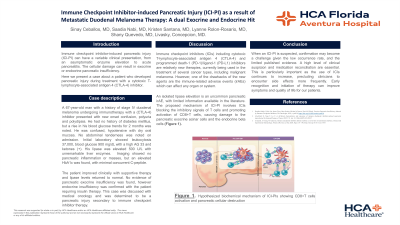Monday Poster Session
Category: Biliary/Pancreas
P1521 - Immune Checkpoint Inhibitor-induced Pancreatic Injury as a Result of Metastatic Duodenal Melanoma Therapy: A Dual Exocrine and Endocrine Hit
Monday, October 23, 2023
10:30 AM - 4:15 PM PT
Location: Exhibit Hall

Has Audio

Sinay Ceballos, MD
HCA Aventura Hospital & Medical Center
Miami, FL
Presenting Author(s)
Sinay Ceballos, MD1, Saadia Nabi, MD2, Kristen Santana, MD2, Lyanne Rolon Rosario, MD2, Shany M.. Quevedo, MD3, Livasky Concepcion, MD2
1HCA Aventura Hospital & Medical Center, Miami, FL; 2HCA Florida Aventura Hospital, Aventura, FL; 3HCA East Florida Division, Aventura, FL
Introduction: The clinical presentation in a case of immune checkpoint inhibitor-induced pancreatic injury (ICI-PI) can range from an asymptomatic pancreatic enzyme elevation to symptomatic acute pancreatitis. The pancreatic cellular damage can result in two types of insufficiency: exocrine pancreatic insufficiency, requiring pancreatic enzyme supplementation or endocrine pancreatic insufficiency defined by new-onset diabetes. Here we present an interesting case about a patient who developed pancreatic injury while undergoing immunotherapy for metastatic melanoma.
Case Description/Methods: A 67-year-old man with stage IV duodenal melanoma undergoing immunotherapy with a cytotoxic T-lymphocyte-associated antigen 4 (CTLA-4) inhibitor presented with confusion, polyuria and polydipsia. On presentation the patient was confused, hypotensive, had a dry oral mucosa and no abdominal tenderness. Initial laboratory showed leukocytosis, elevated serum glucose (900 mg/dl) and positive ketones in urine. His serum lipase was elevated 500 U/L with normal liver function tests. No pancreatic inflammation or masses were seen on imaging. Patient received aggressive intravenous hydration and close monitoring in the ICU. On further testing, no evidence of pancreatic exocrine insufficiency was found; however, endocrine insufficiency was confirmed by new-onset diabetes with elevated glycosylated hemoglobin and minimal C-peptide response. He had a favorable clinical progress with serum lipase levels returning to normal. Findings were discussed with his oncologist and a monitoring plan was established for the duration of immunotherapy.
Discussion: Immune checkpoint inhibitors (ICIs) including cytotoxic T-lymphocyte-associated antigen 4 (CTLA-4) and programmed death-1 (PD-1)/ligand-1 (PD-L1) inhibitors are new effective therapies used to treat several advanced cancer types, including malignant melanoma. An increase in the survival rates of patients undergoing this class of therapy has been reported. However, among the drawbacks are the immune-related adverse events (irAEs). These can affect any organ or system, causing a wide range of clinical manifestations. Lipase elevation is an uncommon irAE, with limited information available in the literature. When an ICI-PI is suspected, confirmation may be a challenge given the low occurrence rate and the limited published evidence.
Disclosures:
Sinay Ceballos, MD1, Saadia Nabi, MD2, Kristen Santana, MD2, Lyanne Rolon Rosario, MD2, Shany M.. Quevedo, MD3, Livasky Concepcion, MD2. P1521 - Immune Checkpoint Inhibitor-induced Pancreatic Injury as a Result of Metastatic Duodenal Melanoma Therapy: A Dual Exocrine and Endocrine Hit, ACG 2023 Annual Scientific Meeting Abstracts. Vancouver, BC, Canada: American College of Gastroenterology.
1HCA Aventura Hospital & Medical Center, Miami, FL; 2HCA Florida Aventura Hospital, Aventura, FL; 3HCA East Florida Division, Aventura, FL
Introduction: The clinical presentation in a case of immune checkpoint inhibitor-induced pancreatic injury (ICI-PI) can range from an asymptomatic pancreatic enzyme elevation to symptomatic acute pancreatitis. The pancreatic cellular damage can result in two types of insufficiency: exocrine pancreatic insufficiency, requiring pancreatic enzyme supplementation or endocrine pancreatic insufficiency defined by new-onset diabetes. Here we present an interesting case about a patient who developed pancreatic injury while undergoing immunotherapy for metastatic melanoma.
Case Description/Methods: A 67-year-old man with stage IV duodenal melanoma undergoing immunotherapy with a cytotoxic T-lymphocyte-associated antigen 4 (CTLA-4) inhibitor presented with confusion, polyuria and polydipsia. On presentation the patient was confused, hypotensive, had a dry oral mucosa and no abdominal tenderness. Initial laboratory showed leukocytosis, elevated serum glucose (900 mg/dl) and positive ketones in urine. His serum lipase was elevated 500 U/L with normal liver function tests. No pancreatic inflammation or masses were seen on imaging. Patient received aggressive intravenous hydration and close monitoring in the ICU. On further testing, no evidence of pancreatic exocrine insufficiency was found; however, endocrine insufficiency was confirmed by new-onset diabetes with elevated glycosylated hemoglobin and minimal C-peptide response. He had a favorable clinical progress with serum lipase levels returning to normal. Findings were discussed with his oncologist and a monitoring plan was established for the duration of immunotherapy.
Discussion: Immune checkpoint inhibitors (ICIs) including cytotoxic T-lymphocyte-associated antigen 4 (CTLA-4) and programmed death-1 (PD-1)/ligand-1 (PD-L1) inhibitors are new effective therapies used to treat several advanced cancer types, including malignant melanoma. An increase in the survival rates of patients undergoing this class of therapy has been reported. However, among the drawbacks are the immune-related adverse events (irAEs). These can affect any organ or system, causing a wide range of clinical manifestations. Lipase elevation is an uncommon irAE, with limited information available in the literature. When an ICI-PI is suspected, confirmation may be a challenge given the low occurrence rate and the limited published evidence.
Disclosures:
Sinay Ceballos indicated no relevant financial relationships.
Saadia Nabi indicated no relevant financial relationships.
Kristen Santana indicated no relevant financial relationships.
Lyanne Rolon Rosario indicated no relevant financial relationships.
Shany Quevedo indicated no relevant financial relationships.
Livasky Concepcion indicated no relevant financial relationships.
Sinay Ceballos, MD1, Saadia Nabi, MD2, Kristen Santana, MD2, Lyanne Rolon Rosario, MD2, Shany M.. Quevedo, MD3, Livasky Concepcion, MD2. P1521 - Immune Checkpoint Inhibitor-induced Pancreatic Injury as a Result of Metastatic Duodenal Melanoma Therapy: A Dual Exocrine and Endocrine Hit, ACG 2023 Annual Scientific Meeting Abstracts. Vancouver, BC, Canada: American College of Gastroenterology.
